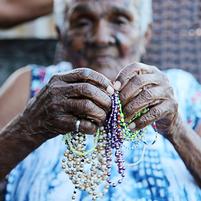This summer many in Whitehall who may need a holiday will be hard at work: The government’s major ‘Integrated Review’ of foreign, military, trade and aid policy is late thanks to the workload generated by the Covid 19 crisis. Some suggest that the delay is a ‘deliberate ruse to avoid scrutiny’ given that DFID is already being folded into the Foreign Office, the pro- government think tank Policy Exchange has proposed that the Department for International Trade should follow suit, and a brilliant King’s College London Professor, John Bew , has been hard at work on the project with Number 10 Downing Street for weeks. If a very recent contribution to these fast moving conversations - from the House of Lords Select Committee on International Relations and Defence - is anything to go by, older people the world over, but especially in its poorest nations, are likely at increased risk from what is currently likely to emerge as the government’s new global direction in the autumn.
Focused on Africa the House of Lords report works hard to present a tone of optimism in pursuit of securing ‘prosperity, peace and co-operation for development’. In its assessment of current priorities however there is an underlying tone of frustration: UK Ministers for Africa have, for two decades, been churned almost annually. There are tensions in the government’s assessment of the security risks presented by Northern Africa compared to development needs elsewhere. The Peoples’ Republic of China is wiping the floor with the UK in its dealing with the continent’s 54 states. The net result is that Africa’s leaders are inclined to believe that the UK does not take them seriously. In seeking to combat these omissions though the Lords Committee itself falls into the FCO’s dominant narratives that by default discriminate on the grounds of age.
For example, the devastation of the current pandemic is noted but not its disproportionate impact on older Africans. As South Africa struggles with lockdown and health systems stretched to the brink, no mention of actual and forecast rapid growth in the proportion of over 65s in that country is recorded. Remittances from the Global North to the Global South – greater in value than any aid budget - have collapsed under the pandemic but the inter-generational support this often provides merits no mention either.
There are 40 million people over 60 in Africa and that figure will increase to 160 million by 2050. Botswana, Rwanda and South Africa especially are set to experience significant increases in the absolute number and proportion of older people. Over and above the usual challenges their needs will be further enhanced by the extensive caring roles they have taken on in the aftermath of HIV/AIDS. Nevertheless while the report’s equalities impact assessment names the continent wide risks to women, LGBTQ citizens, and freedom of religion and belief it omits any mention of Africa’s ‘greying’ nor the weak support afforded by outdated disability protections, and fragmented elder ‘carescapes’. Separately the All Party Parliamentary Group on Africa has recently been pointing to something similar when it comes to the life journeys of Africans living with mental ill health.
Indeed, as in so much policy discourse Africa emerges in the report as a ‘young continent’ posing security threats because of the levels of youth disaffection likely to occur as its population expands. There is nothing of the ‘lifespan’ impacts of war, drought, urbanisation, or even niche areas of potential economic growth. Older people as voters, as active shapers of their futures or as voices in the diaspora do not break through. The contrast with some PRC utterances is striking even if one only records China’s conviction that its own assistive tech market for older and disabled people will soon be worth more than £100 billion and that since 2016 it has been deliberately investing at home and abroad to build science parks with the capacity to take advantage of related global opportunities.
The HoL report is not of course entirely closed to the UK’s potential to improve on all this. Despite an able and experienced membership the Select Committee could not cover every necessary step of ground if it was to complete its work. It recognises how the UK’s domestic policies affect how it is perceived in Sub-Saharan Africa (one thinks here of care homes in 2020). It calls for Africa to be a ‘strategic’ priority and for the development of a full Africa action plan linked to the Integrated Review.
It thinks the government could do better and it could. As Professor Bew, an enlarging FCO, an ambitious MOD and the wider international UK policy community steps up the pace this summer they need to be reminded that the future can be bright – and to be bright it has to be self- consciously designed around the ‘grey’.
About the Author:
Francis Davis is Visiting Professorial Fellow in the Institute on Ageing Population , Professor of Communities and Public Policy at the University of Birmingham and Visiting Professor in Social Justice and Innovation at St Mary’s University Twickenham. Zambian born he has held ministerial advisory roles in the UK government working on religion, race, and disability inclusion and has volunteered with Remembering Srebrenica and the Holocaust Memorial Day Trust.
Opinions of the blogger is their own and not endorsed by the Institute
Comments Welcome: We welcome your comments on this or any of the Institute's blog posts. Please feel free to email comments to be posted on your behalf to administrator@ageing.ox.ac.uk or use the Disqus facility linked below.













